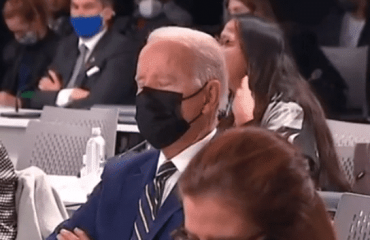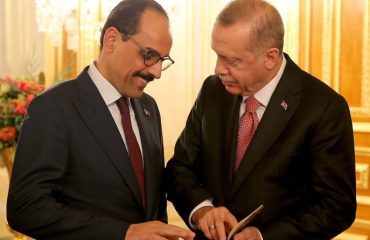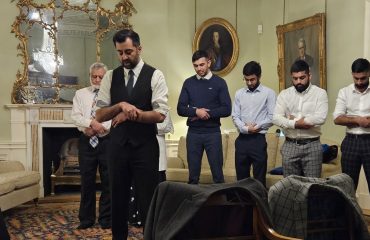

AKP’s Ömer Çelik’s announcement about the end of DEM-Öcalan visits, together with the increase in judicial proceedings against opposition voices, points to rising tension before the approaching storm.
With “the crackdown” in the title, I’m referring to a series of judicial proceedings spanning from talent agent Ayşe Barım’s arrest in connection with the Gezi Park case to the latest investigation into Istanbul Metropolitan Mayor Ekrem İmamoğlu for exposing the identity of a common expert witness in cases against CHP municipalities, and extending to the arrest of Zafer Party leader Ümit Özdağ. It appears there’s an effort to minimize dissenting voices on the “home front” as the storm approaches.
The storm’s herald was AKP Spokesman Ömer Çelik. During his January 27 press conference, he talked about DEM Party’s visits to PKK leader Abdullah Öcalan and said “The visit traffic has concluded”
“Next, we await the emergence of the call for the terrorist organization’s dissolution,” he added.
Through these statements, Çelik announced the closing of one act in the “Öcalan Initiative,” which MHP leader Devlet Bahçeli had initiated in early October 2024. The implication is that they’ve conveyed their message to Öcalan through DEM Party. The next act will be brief; all eyes are on Öcalan’s response.
The AKP thus demonstrated careful attention to avoid contradicting Bahçeli’s expectation from two weeks prior regarding “a call for PKK’s dissolution in the second meeting.”
Meanwhile, the PKK appears to have explicitly tied any progress in Türkiye to developments in Syria, stating “No message without a Rojava solution.”
PKK diplomacy in full swing
Çelik’s remarks were aimed at establishing parameters, perhaps even applying restraint, ahead of Bahçeli’s anticipated parliamentary address on January 28. Prior to this, on January 22, we witnessed the DEM delegation’s meeting with Öcalan (this time without Ahmet Türk, but including Pervin Buldan and Sırrı Süreyya Önder), followed by Ankara’s intensified diplomatic efforts seeking a diplomatic resolution to the PKK issue.
Foreign Minister Hakan Fidan engaged in discussions in Iraq, while MIT Chief İbrahim Kalın conducted talks in Syria regarding joint action against the PKK and affiliated organizations, while simultaneously maintaining dialogue with US authorities. It’s evident that the desired outcomes haven’t been fully achieved yet. It seems all stakeholders, from Kandil to Damascus, are awaiting the conversation between President Tayyip Erdoğan and US President Donald Trump, and whether the emerging situation will culminate in a storm.
The critical issue here is Ankara’s threshold of patience. In fact, based on Erdoğan’s “We may come suddenly one night” statements, there were speculations that a military operation against PKK-affiliated groups in Syria might be launched before Trump’s assumption of office on January 20. That scenario was postponed following Trump’s statements and likely through back-channel diplomacy.
Ankara seems intent on demonstrating that it has exhausted all diplomatic avenues.
Storm potential and the home front
Nevertheless, Ankara harbors calculations and concerns that the longer this situation persists, the more entrenched PKK’s institutionalization in Syria will become.
As emphasized in the recent National Security Council meeting, Türkiye considers PKK’s institutionalization in Syria its primary security threat. Particularly in light of developments in the Russia-Ukraine war and Israel’s annexation of the West Bank and potential expansion into Syria, Türkiye might reintroduce military intervention to its agenda; all preparations appear to be in place.
I find it unlikely that Öcalan would call for the dissolution of the PKK, an organization he founded, or advocate for abandoning armed struggle. Even if he were to make such a call, it’s highly questionable whether the PKK would comply.
Erdoğan’s frequent emphasis on “strengthening the home front” is significant in both contexts. Suppose the PKK refuses this reconciliation but the DEM party accepts it. In that case, the preemptive suppression of opposing factions might be deemed necessary; Ümit Özdağ’s arrest fits this pattern. In the event of military action, there appears to be apprehension about another Gezi-like situation; the Ayşe Barım case aligns with this concern.
Keeping the opposition on the defensive
The pressure on the CHP in general, and Ekrem İmamoğlu in particular, clearly serves to maintain the main opposition in a defensive posture. If İmamoğlu, who along with Mansur Yavaş represents one of the two formidable challengers to Erdoğan’s now-openly-declared goal of seeking another presidential term, is barred from politics through judicial decisions, Erdoğan anticipates benefiting from this outcome.
Of course, there’s room for miscalculation – plans might not unfold as intended, and excessive pressure could backfire in such situations. However, what’s crucial here is that Erdoğan and the AKP believe in this strategy.
The approaching storm represents a radical step in Kurdish affairs broadly and the PKK issue specifically; this characterization applies to both scenarios. We’re already witnessing initiatives aimed at preemptively silencing potential dissenting voices under the “home front” logic, as evidenced by the increasing investigations targeting journalists.


